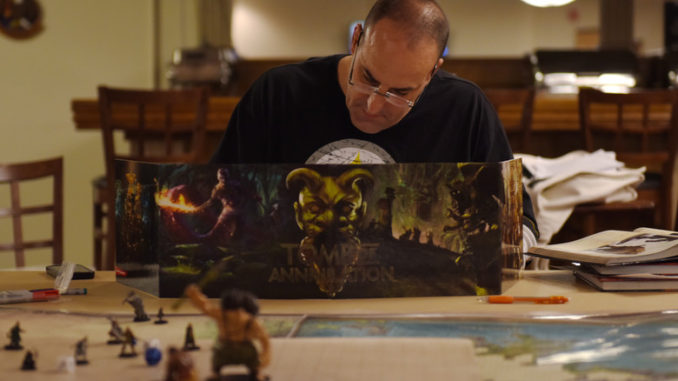
Welcome to my new column on the D20 Radio Blog! I’m very excited to be here with a regular feature and I hope that you will find the content I provide to be of use to you at your game table. Thirty-eight years ago I began my foray into gaming with the Dungeons and Dragons Basic Set. Since then I have Game-Mastered or played dozens of different RPG systems and many more miniature, card, and board games. Like all Old Gamers, I like to talk about my adventures and reminisce about both the good times and the bad times. I want to both entertain and enlighten you as you follow me in my delve down memory lane!
I think that every gamer who decides to try his hand at running a game starts in the same place; excited, eager to get started, and really uncertain about how things are going to go. You’ve got the game book in your hand, you’ve read it cover-to-cover, you’ve got potential players, and you probably have a basic idea of what you want to try. You probably have doubts and apprehension as well as you are stepping out of your comfort zone and doing something new.
My advice: silence those nagging doubts and take the plunge. No matter what happens you will survive and you will learn from the experience. You have nothing to lose but time. At the worst, you decide to relinquish the GM seat to someone else. I’ve run a few games before that I will never try running again, but I will play them in a heartbeat. The old Marvel Super Heroes RPG comes to mind as I could never get the right feel of a comic book for my villains and plots, but I will play it or DC or Champions at the drop of a hat. I guess that means I love reading comics, but not writing them so much.
So you decide to move forward and run a game. The next consideration is whether you spend a lot of time creating an adventure from scratch or do you use a published adventure so that you can start right away? One big advantage for people starting in the hobby today is the internet and the wealth of material that can be downloaded and adapted to your needs. When I started with D&D I had to either create my own delves or buy a module created by TSR, so revel in the plethora of resources you have at your disposal. Still, nothing beats the feeling of creating your own adventures as you can tailor them to the world you want to create so definitely give it a whirl at some point.
As you prepare to run your first session, don’t worry if you don’t have a plan beyond that first time in the GM’s chair. Very rarely do I sit down for a first session with a new game system and have any planned story arcs. Most of the time I am just trying to focus on the adventure and see where things go. If the players and I both have fun, then I begin planning how the next session will connect to what we’ve done. That’s when I make the conscious decision of whether or not what we’ve done is the start of a new campaign or just a one-off game. With experience you will begin refining your storytelling abilities and creating sweeping stories that can carry your players through years of play. My first session running the West End Games Star Wars RPG (d6) was just a supply run with a couple of planned encounters and that spawned a campaign which lasted 13 years from undergraduate school into my thirties.
With experience you will become comfortable with a given game system or genre and begin developing ideas for a story arc or campaign from start-to-finish. This is when you can also bring together your established group of players and have a session “zero” to introduce them to your campaign and get them connected and bought-in. About five years into my first Star Wars campaign a few of the players expressed desires to try new character archetypes, but they also didn’t want to completely abandon their experienced PCs. My solution was to craft a new story with new heroes set in the Rebellion Era, but a different timeline; the two groups would play in different sandboxes. I began keeping notes from then on labeled “Old Group” and “New Group” to keep them straight. Today, it would probably be comparable to running an Edge of the Empire campaign and then starting a separate Age of Rebellion campaign just to mix things up. Our session zero for the New Group involved the PCs coming together through their individual journeys to join up with the Rebel Alliance. They became a team while overcoming treachery and betrayal en route to meet a Rebel agent and this forged their bonds they carried forward.
It looks like I’ve covered a lot of broad areas involved with getting started as a GM. In coming weeks, and probably months, I will continue to build on these and other themes in this column. Occasionally, I may veer to non-RPG games, podcasts, NPC stats, etc., but most of my focus will be on the ups and downs of GM’ing an RPG. My goal is to have something that appeals to gamers of all stripes from the novice to the expert, young to the old, and active to inactive. Welcome to the Campaign Headquarters!
Latest posts by Brian Wilson (see all)
- Campaign HQ – Going Out With A Bang…or a Whistling Bird…At Least - April 14, 2020
